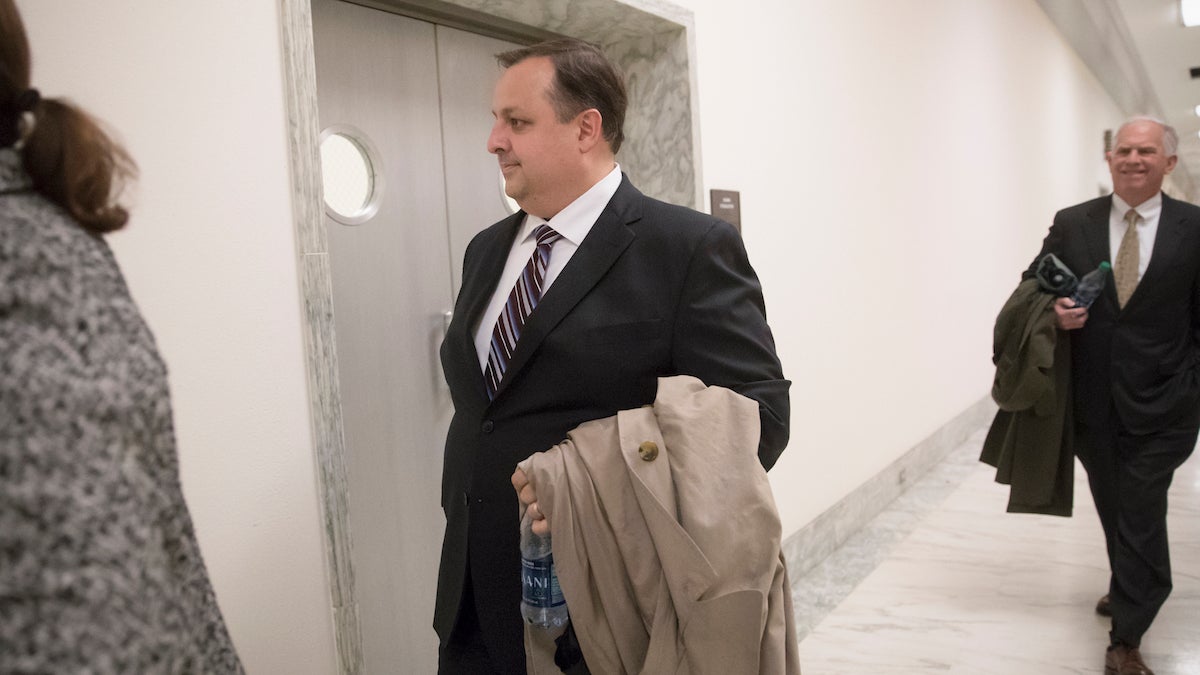Trump’s ethics watchdog quits his thankless job

In this Jan. 23, 2017 file photo, Walter M. Shaub Jr., director of the U.S. Office of Government Ethics walks on Capitol Hill in Washington. (AP Photo/J. Scott Applewhite, File)
The Trump regime’s corruptive trampling of ethical norms has become so routine that we’re already numb. Which is why we barely noticed the other day when the director of the Office of Government Ethics abruptly quit his job.
It’s OK to admit that you didn’t hear the news about Walter Shaub. And that you probably never heard of Walter Shaub. Amidst the constant turbulence in the Trump cesspool – the latest is that Trump Junior met in June ’16 with a Russian lawyer after being told in an email that she had anti-Hillary dirt from the Russian government – you’re excused for not knowing that we even have an Office of Government Ethics.
But as Shaub said on Sunday, it was impossible to get those kleptopirates to behave. Although he said it a tad more diplomatically than that: “I really always thought that the ethics rules were strong enough to protect the integrity of the government’s operations. My recent experiences have convinced me (otherwise)…Every White House in both Democratic and Republican administrations have been incredibly supportive of the ethics program – until now.”
The problem, as we all know, is that Trump’s alleged governance is in blatant conflict with his business profiteering; defying Shaub’s advice, and shattering the norms that guided all post-Watergate presidents, Trump has refused to seperate himself from his business empire by putting it in a blind trust with no family involvement. The Office of Government Ethics has no enforcement power. It depends on voluntary compliance. Trump won’t comply, and Shaub has given up.
As he said on Sunday, “Every past president since enactment of the (1978) Ethics and Government Act has understood that a president can have conflicts of interest and should address them, (but) the breach of that ethical tradition has been the start of every problem in the past several months.” All told, “I’ve achieved all I can possibly achieve in this job.”
Shaub tangled with Trump from day one of the new era, all for naught. On the job satisfaction scale, being the ethics watchdog of Trumplandia is roughly on a par with campaigning for press freedom in Russia. Shaub’s departure is fresh evidence of how democratic standards are eroding day by day, numbing us in the process.
Naturally, Trump’s defenders have tried to tag Shaub as a “partisan,” citing the fact that President Obama hired him as the OGE director in 2013. But it’s also a fact that Shaub joined the OGE under George W. Bush, became the attorney in charge of the presidential nomination program under Bush (giving nominees guidance on how to avoid conflicts of interest), and rose to the job of OGE deputy general counsel under Bush.
And here’s what Businessweek – hardly a pejorative “partisan” outlet – said last month about the Trump regime: “Until now no president has attempted to grip the reins of state while retaining ownership of such a sprawling range of corporate interests…before Trump, we’d never had a president with business interests so vast and secret. If ever there were a time to test the Emoluments Clause, this is the time.”
Ah yes, the Emoluments Clause. Section 1, Article 9 of the U.S. Constitution specifically bars all federal officials – no exceptions – from profiteering while in office: “…no person holding any Office of Profit or Trust under them, shall, without the Consent of Congress, accept any present, Emolument, Office, or Title, of any kind whatsoever, from any King, Prince, or foreign State.” The dictionary defines emolument as “a salary, fee, or profit from employment or office.”
Shaub quit his job because he had no power to enforce conflict-of-interest rules; Congress has enforcement power, as Article 9 stipulates, but the current Republican Congress prefers to go belly up on Trump corruption. Which leaves us with the judiciary. And Trump is being sued in federal court – by a nonpartisan ethics watchdog group, joined by the state of Maryland and Washington D.C. as co-counsel – over his serial violations.
That lawsuit seems like a long shot; the plaintiffs need to establish “standing,” which means that Maryland and Washington have to prove that Trump’s domestic hotels and clubs are taking business away from their public convention centers. Trump’s Justice Department has also pointed out that a few presidents, like George Washington, did some business while in office. But unlike Trump, none ever did business on a domestic or global scale.
As Trevor Potter, a former Republican chairman of the Federal Election Commission, warned last November, Trump has “conflicts of interest of an unprecedented magnitude,” and unless he agreed to the same standards that have guided all post-Watergate presidents, “we will look like the very sort of kleptocracy we criticize in corrupt dictatorships elsewhere.”
That’s the fight Walter Shaub waged and lost.
——-
Hat tip today to my summer research assistant, Dominic Casciato.
——-
Donald Junior in July ’16, scoffing at Hillary’s claim that the Trump campaign was in cahoots with Russia: “Disgusting.”
Junior one month earlier, emailing in response to an explicit offer of Hillary dirt from the Russian government: “I love it.”
——-
Follow me on Twitter, @dickpolman1, and on Facebook.
WHYY is your source for fact-based, in-depth journalism and information. As a nonprofit organization, we rely on financial support from readers like you. Please give today.

